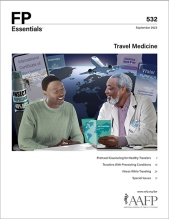
This clinical content conforms to AAFP criteria for CME.
Before the COVID-19 pandemic, international travel was increasing at a brisk rate. After a lull, it is picking up again and predicted to continue to climb as it had previously. International travel presents some unique health hazards, including infectious diseases, chronic disease exacerbation, environment-related illness, accidental injuries, and transportation-related illness. Many travelers appropriately seek medical consultation for advice and interventions to decrease their health risks during travel. The pretravel consultation consists of risk identification and preventive interventions. Although these consultations traditionally have occurred with infectious disease specialists, family physicians can and should provide this care. Pretravel consultations should review a patient’s medical conditions, how travel can affect them, and what the patient can do to address medical needs that may arise while abroad. Balancing the risks likely to be encountered with the individual traveler’s risk tolerance, patients and family physicians can collaboratively develop a strategy to mitigate these risks and increase the likelihood of an uneventful (and enjoyable) sojourn.
Case 1. EW is a 27-year-old patient who comes to your office for a pretravel consultation 3 weeks before travel to Thailand and Cambodia. She does not have a detailed itinerary, but the trip will include Bangkok, Chiang Mai, Phuket, Angkor Wat, and other popular tourist destinations. Her medical history is unremarkable. EW is up-to-date on standard domestic vaccinations, including those for influenza and COVID-19. She is unsure which vaccines are recommended for travel to these countries and asks whether malaria prophylaxis will be needed.
Subscribe
From $350- Immediate, unlimited access to FP Essentials content
- 60 CME credits/year
- AAFP app access
- Print delivery available
Edition Access
$44- Immediate, unlimited access to this edition's content
- 5 CME credits
- AAFP app access
- Print delivery available
